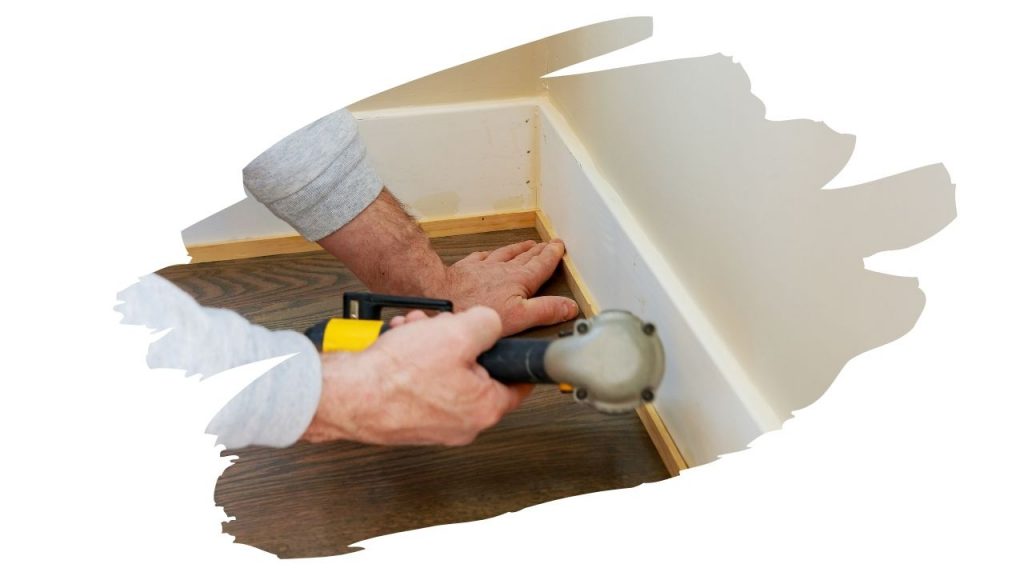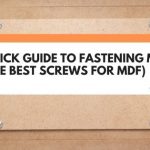Buying any power tool is a big decision. So many models to choose from, so many opinions. It’s confusing!
And when it comes to choosing the right nailer, there are many things to take into account. For example, do you go for a finishing nailer, or a brad nailer? A 15 gauge or a 16 gauge? It’s not easy to decide…
However, when it comes to MDF trim, the decision is pretty simple. For the best results you should use a 16 gauge finish nailer.
If you are installing MDF trim, try to avoid using large nailers. Instead, opt for the small and light 16-gauge nailer power tool.
Having said that, you can get by with a 15-gauge finish nailer too.
However, the right tool for the job can make all the difference. And what you need for this particular job is something that offers you effortless versatility.
So keep reading to discover why this particular type of nailer is the best choice for installing MDF trim…

This post may contain affiliate links to products that we receive a commission for (at no additional cost to you). Learn more here.
First Off, Is MDF Good For Trim?
Medium-density fiberboard (MDF) is a popular composite building material that has become almost synonymous with its wood source. Yet the material itself is not wood at all. MDF is just another tree product that’s been pulped, reformed, and reshaped.
You see, MDF is a man-made composite comprised of small wood particles, held together with a resin binder. Compared to the natural material it resembles, MDF is more sturdy and dense, with a smooth surface.
Now, thanks to MDF’s smoothness, paint adheres to it very well. Which is why MDF is a good and affordable option for trim.
Related Post: MDF Vs Pine Crown Molding (Is MDF Better Than Natural Solid Wood?)
Should You Use A Brad Nailer Or A Finish Nailer For Baseboard?
When you’re working on an assortment of home DIY projects, it’s important to have high-quality tools that offer real versatility. Which is why finish nailers are so useful. They are great for a lot of different carpentry jobs like framing, stairs, and even flooring.
It is also the perfect tool for your trim and baseboard projects. This powered gizmo is lightweight and compact, so you can use a finish nailer up high or in tight spaces.
Now, if you want to do a little trim work but don’t need so much force, you should grab a 16-gauge finish nailer.
A 16-gauge has thinner nails compared to the similar 15-gauge tool. However, don’t let those slender nails fool you as they can easily fasten baseboard.
One of the best 16 gauge finish nailers on the market right now is the Ryobi P325 One+ 18V Lithium Ion Battery Powered Cordless 16 Gauge Finish Nailer. This compression-free straight finish nailer can fasten up to 800 nails off a single charge.
You can click here to check out the latest prices for the Ryobi Finish Nailer over on Amazon.
But Isn’t A 15-Gauge Too Big For Trim?
First off, you can use a 15 gauge nailer on MDF trim. It will allow you to nail a thicker nail, which should fasten trim down more securely.
However, the holes those nails leave behind are noticeably bigger. And there is also the increased chance of those 15-gauge thick nails fracturing that MDF material.
For best practice – and to minimize the chances of fractures – you will need to nail a good distance away from the edge of the baseboard. But please be aware that if you drive your nails too close to the brim, it is possible to split that trim.
So, if you plan on using a 15-gauge finish nailer, try to stay between a 1/2 inch to 1 inch away from the edge.
Which Is Better, A Straight Or An Angled Finish Nailer?
The difference between a straight finish nailer and an angled finish nailer is, well, all a matter of degrees.
An angled finish nailer comes in a range of degrees (typically anywhere from 30 to the 34 degree range). However, the key thing to bear in mind is that the bigger the angle, the better that nailer will be at fitting trim into tight spaces.
Now, besides being more versatile in nailing down trim into difficult corners, angled finish nailers can hold more nails per charge. Plus, they can fasten nails with bigger nail-heads far more securely, which helps to really keep trim in place.
But, straight nailers have one big advantage. And that is? Well, straight finish nailers shoot finer nails whose nail-heads are barely visible on exposed trim.
Basically, it all boils down to style over function. An angled finish nailer makes easy work of fitting trim every which way possible. While straight finish nailers make it easier to hide finish nails later on after the job is done.
Now the Ryobi P325 One+ is a great 16 Gauge Straight Finish Nailer (that you can get over on Amazon by clicking here). But, this nailer doesn’t quite have the adaptability of an angled finish nailer.
If you want to get your hands on a top quality angled nailer, then look no further than the surprisingly lightweight DEWALT 20V MAX Finish Nailer. It comes with a mega 110 nail capacity and has superb battery life to boot.
You can click here to check out the latest prices for the DEWALT Finish Nailer over on Amazon.
Can You Install Trim With A Brad Nailer?
To be perfectly honest, the key to firmly installing trim boils down to the width and length of the nails.
Longer thicker nails fasten more securely than shorter thinner ones. And that is because longer nails can reach through to lock onto the wall behind that trim installation.
Now, the nails used in a brad nailer are thinner and shorter than those used in finish nailers.
So if you use a brad nailer on that thicker sturdier MDF material, those 2 inch long nails aren’t going to make their way through to the other side of the board.
In other words, a brad nailer won’t do a good job of fastening down heavy trim (such as MDF trim). However, a brad nailer can be used to install lightweight decorative trim and paneling.
So To Sum Up…
No one wants to make an impulse decision, especially when it comes to installing MDF trim. And a nailer tool is not something you buy on a whim.
Each nailer has unique features that set it apart from the others. And the key is finding one that delivers everything you want at a price you can afford.
The Ryobi P325 One+ 16 Gauge Finish Nailer offers all of that and more. It is lightweight, powerful, and ideal for fastening MDF trim with ease while giving you a professional edge.





